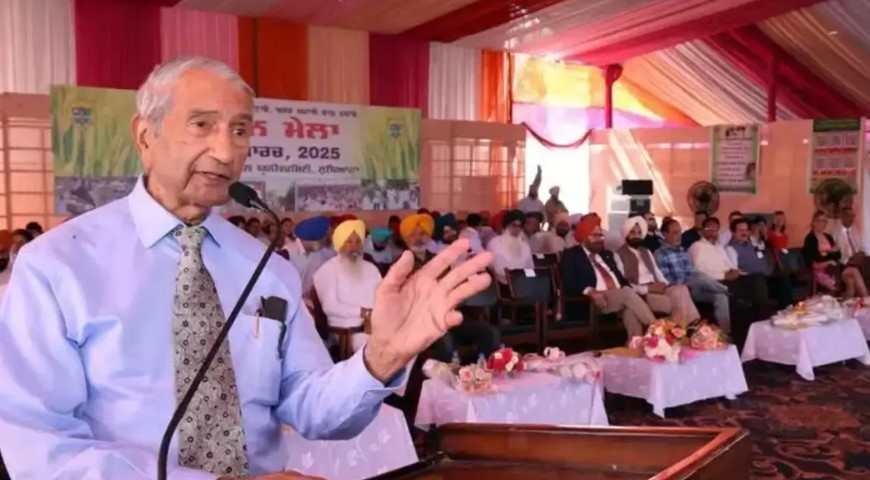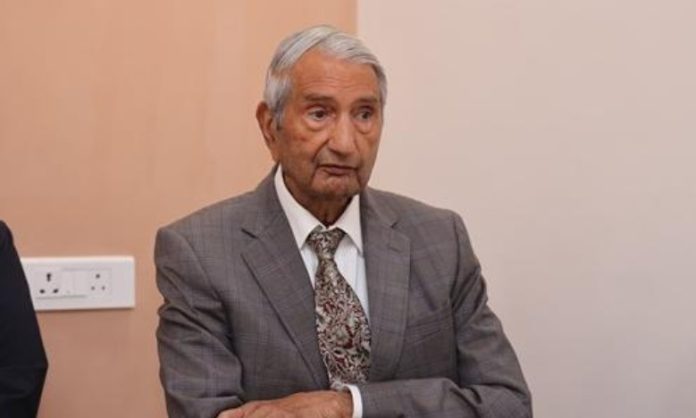Dr. Gurdev Khush, a globally renowned agricultural scientist and recipient of the prestigious World Food Prize, has emphasized the urgent need for Punjab to adopt water-wise farming practices to ensure the sustainability of its agricultural sector. Speaking at a recent event, Dr. Khush highlighted the alarming depletion of groundwater levels in Punjab and warned that if immediate action is not taken, the state’s agricultural productivity could face severe challenges in the coming decades. His call for a shift in farming techniques comes at a time when Punjab, once celebrated as the “Granary of India,” is grappling with an environmental crisis that threatens its long-term agricultural viability.
Punjab’s agriculture is heavily dependent on groundwater, which has been over-extracted for decades due to the intensive cultivation of water-guzzling crops such as paddy (rice) and wheat. The Green Revolution, which brought tremendous prosperity to the region in the 1960s and 1970s, introduced high-yielding varieties of these crops that required substantial irrigation. While the revolution helped India achieve food security, it also led to an over-reliance on groundwater, as farmers increasingly turned to tube wells and borewells to meet irrigation demands. Today, the consequences of these practices are evident, with groundwater levels dropping at an alarming rate of 1-1.5 meters annually in many parts of Punjab.
Dr. Khush, who played a pivotal role in developing high-yielding rice varieties that transformed global food production, stressed that Punjab must now lead the way in adopting sustainable farming techniques. He noted that while technological advancements have helped increase food production, they have also placed immense stress on natural resources. The state’s current water crisis is a direct result of over-extraction and inefficient irrigation practices, and unless urgent steps are taken, Punjab’s ability to sustain its agricultural output could be compromised.
One of the key solutions Dr. Khush proposed is the diversification of cropping patterns. He urged farmers to move away from excessive rice cultivation and consider growing less water-intensive crops such as maize, pulses, and oilseeds. He pointed out that Punjab’s traditional cropping system, which included a diverse range of cereals, legumes, and oilseeds before the Green Revolution, was more sustainable and better suited to the region’s agro-climatic conditions. By promoting crop diversification, farmers can reduce their dependence on groundwater while also improving soil health and overall farm productivity.

Dr. Khush also highlighted the importance of adopting advanced irrigation methods such as drip and sprinkler irrigation. Unlike traditional flood irrigation, which leads to significant water wastage, drip and sprinkler systems ensure that water is delivered directly to the roots of plants, minimizing loss through evaporation and runoff. He encouraged the government to provide greater incentives and subsidies to farmers willing to invest in these modern irrigation technologies.
In addition to improved irrigation techniques, Dr. Khush advocated for the use of climate-resilient crop varieties that require less water and are more resistant to drought conditions. He pointed to ongoing research in developing drought-tolerant and water-efficient rice and wheat varieties, which could play a crucial role in reducing water consumption while maintaining high yields. Investing in such research and making these improved varieties available to farmers can significantly contribute to water conservation efforts.
The excessive use of chemical fertilizers and pesticides has further exacerbated Punjab’s water crisis. Dr. Khush emphasized the need for farmers to adopt natural and organic farming practices that reduce reliance on synthetic inputs. Practices such as crop rotation, integrated pest management, and the use of bio-fertilizers can enhance soil fertility and reduce the contamination of water sources. Excessive fertilizer application not only leads to soil degradation but also results in nitrate leaching, which contaminates groundwater and poses health risks to humans and livestock.
Another crucial aspect of water-wise farming is rainwater harvesting and groundwater recharge. Punjab receives a significant amount of rainfall during the monsoon season, but due to poor water management, much of this rainwater is lost as surface runoff. Dr. Khush called for the construction of check dams, ponds, and other water conservation structures to capture and store rainwater, which can then be used for irrigation during dry periods. He also urged policymakers to implement measures that promote artificial groundwater recharge, such as recharging wells and reviving traditional water bodies.
The role of government policies in driving this transition cannot be overstated. Dr. Khush emphasized the need for a comprehensive policy framework that incentivizes sustainable agricultural practices. He called on the Punjab government to provide financial assistance, technical support, and awareness programs to help farmers adopt water-saving technologies and diversify their cropping patterns. He also suggested revisiting the procurement policy that currently favors rice and wheat, arguing that incentivizing alternative crops through assured procurement and price support could encourage farmers to make the shift.
Education and awareness play a vital role in bringing about behavioral change among farmers. Dr. Khush suggested that agricultural universities, research institutions, and extension agencies should work closely with farmers to train them in water-efficient practices. Conducting workshops, field demonstrations, and awareness campaigns can help farmers understand the long-term benefits of sustainable farming and encourage them to adopt new techniques.
The need for community participation and collective action was another key point raised by Dr. Khush. He urged farmers to come together and form water management cooperatives that can collectively implement best practices for water conservation. By working together, farmers can share resources, invest in water-saving infrastructure, and create a more resilient agricultural system.
Dr. Khush also emphasized the importance of leveraging technology in agriculture. Precision farming techniques, remote sensing, and data analytics can help farmers make informed decisions about water usage, crop selection, and soil health. The integration of digital tools can enable real-time monitoring of water levels and optimize irrigation schedules to maximize efficiency.
The transition to water-wise farming in Punjab will not be easy, but it is necessary for the long-term sustainability of agriculture in the region. Dr. Khush acknowledged the challenges involved in changing deep-rooted farming practices but expressed confidence that with the right policies, incentives, and awareness, Punjab can lead the way in adopting a more sustainable agricultural model.
The water crisis in Punjab is not just an agricultural issue; it has far-reaching implications for food security, rural livelihoods, and environmental sustainability. If the state continues to deplete its groundwater resources at the current rate, the consequences could be devastating for future generations. However, with visionary leadership, scientific innovation, and active participation from farmers, it is possible to reverse the trend and create a more resilient and sustainable agricultural system.
Dr. Gurdev Khush’s appeal for a shift to water-wise farming is a wake-up call for policymakers, farmers, and the public alike. His insights, backed by decades of research and experience, offer a roadmap for transforming Punjab’s agriculture into a model of sustainability. As Punjab stands at a crossroads, the choices made today will determine the future of its farmlands and the well-being of its people. The time to act is now, and by embracing sustainable practices, Punjab can ensure that its agricultural legacy continues for generations to come.


